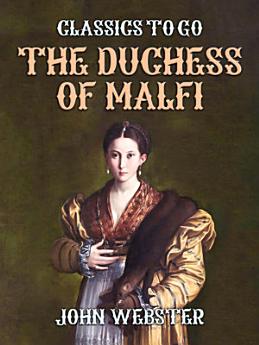The Duchess of Malfi
Mar 2020 · Otbebookpublishing
Ebook
86
Pages
family_home
Eligible
info
reportRatings and reviews aren’t verified Learn More
About this ebook
The Duchess of Malfi (originally published as The Tragedy of the Dutchesse of Malfy) is a Jacobean revenge tragedy written by English dramatist John Webster in 1612–1613. Published in 1623, the play is loosely based on events that occurred between 1508 and 1513 surrounding Giovanna d'Aragona, Duchess of Amalfi (d. 1511), whose father, Enrico d'Aragona, Marquis of Gerace, was an illegitimate son of Ferdinand I of Naples. As in the play, she secretly married Antonio Beccadelli di Bologna after the death of her first husband Alfonso I Piccolomini, Duke of Amalfi. The play begins as a love story, when the Duchess marries beneath her class, and ends as a nightmarish tragedy as her two brothers undertake their revenge, destroying themselves in the process.
About the author
John Webster, an enigmatic figure of the 17th century, remains a captivating subject for those intrigued by the intersection of science, religion, and literature. Born around 1610, Webster's life unfolded during a period of profound upheaval in England, marked by the Civil War, the execution of Charles I, and the rise of the Commonwealth under Oliver Cromwell. A polymath, Webster was a clergyman, physician, and scholar whose intellectual pursuits spanned a variety of disciplines.Webster's literary contributions are notable for their bold challenges to the prevailing orthodoxies of his time. He was a fervent critic of the established medical practices and superstitions, advocating for a more empirical approach to science and medicine. His works often sparked controversy, as they questioned the legitimacy of widely accepted beliefs and practices, including the persecution of supposed witches and the reliance on alchemy.One of Webster's most revolutionary ideas was his early support for the scientific method, which placed him in the company of contemporary thinkers like Francis Bacon. His insistence on evidence-based inquiry influenced the gradual shift towards modern scientific thought, making him a precursor to the Enlightenment.Webster's influence extended to his contemporaries and beyond, as his writings provided a foundation for later debates on science and rationality. His life and work offer a fascinating glimpse into a transformative period in history, where the seeds of modernity were being sown amidst the remnants of medieval thought. For modern readers, Webster's legacy is a testament to the enduring power of questioning and intellectual courage.
Rate this ebook
Tell us what you think.
Reading information
Smartphones and tablets
Install the Google Play Books app for Android and iPad/iPhone. It syncs automatically with your account and allows you to read online or offline wherever you are.
Laptops and computers
You can listen to audiobooks purchased on Google Play using your computer's web browser.
eReaders and other devices
To read on e-ink devices like Kobo eReaders, you'll need to download a file and transfer it to your device. Follow the detailed Help Center instructions to transfer the files to supported eReaders.








